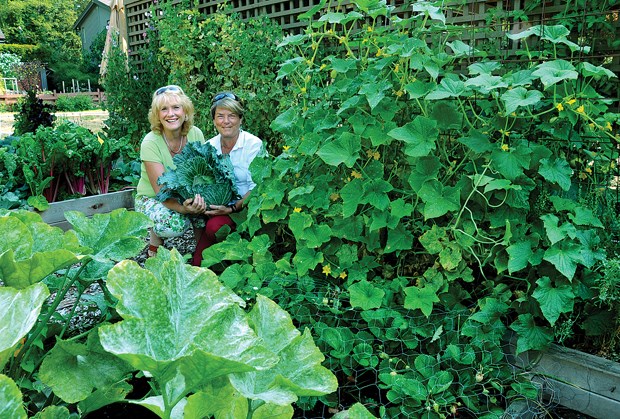On a small piece of District of North Vancouver land next to the Plateau Village townhouse complex sits a flourishing veggie garden created by two hardworking women.
Heather Maytum and Jenafor Shaffer decided in 2010 that they were going to transform the weed ridden and overgrown piece of district land into something beautiful that would yield fresh vegetables. Their work has produced fresh veggies and an unexpected outcome - increased engagement by residents in the neighbourhood.
There were detractors to their idea but they forged ahead working tirelessly to create something from a sloped bank of weeds. Getting the weeds and rubbish removed was only part of the challenge, they had to get permission to occupy and build on district land. Enter Courtenay Fraitzi, community beautification co-ordinator for the district who became a supporter of the project and dare I say, the project's municipal champion. Although other district staff was involved in the project it is Fraitzi who continues to champion the project.
You can tell when people make a connection by how they greet each other. When I went to the garden to meet everyone, Fraitzi greeted Maytum and Shaffer with big hugs and smiles, a sign of real happiness and connection. It was a peak moment to witness. How many municipal officials do you know that would hug you when you meet them without being disingenuous? The Plateau Village sharing garden is part of the district's "Adopt a Street" program but it's much more than the traditional picking up litter approach.
"It's about giving back and building community. Even small gardens like this one help neighbours connect with each other," Fraitzi said of the project.
"Those women have inspired me with their commitment and I wanted to help them grow their garden."
There were challenges encountered during the building of this garden. Deep rooted perennials like knotweed were present and had to be dug out.
Blackberries and other weeds had to be cut down and dug out across the long, uphill slope. DNV park staff removed two truckloads of greenwaste and brought in enough wood chips to mulch for the site.
Maytum and Shaffer have spent more than $1,500 of their own money for plants, soil, seeds and wood for garden boxes to improve the site. Shaffer's husband Lee was brought in as the muscle for the project to build boxes and do some of the heavier work. They have also repurposed old chairs, wire fencing and a bench to enhance the garden.
It's difficult to translate into words the emotions I see and experience during such interviews but I can tell you that both women seem to have found significant enjoyment and a sense of accomplishment in building the garden. They spoke with me at length about the growth of the garden.
"This project has opened my eyes to the possibility of Jenafor and me starting our own gardening company to build gardens for people," Maytum said. "I like learning and working with people and this process has been a learning experience."
Maytum is the more reserved of the two women but nonetheless enthusiastic. She spoke passionately about her experiences and ideas for the future of the garden.
Shaffer, on the other hand, is boisterous and extroverted with enthusiasm to spare.
"I grew up on a farm so growing veggies was part of my childhood," she said. "Gardening lets you live in the now. It relieves stress and focuses your attention so clearly that all your problems fall away."
Both women told me the main reason they started the project was primarily to grow fresh organic veggies. They also said the positive interactions with local residents who come by to see the garden are excellent side benefits that build friendships" Even children from the neighbourhood are interested in the garden. "The children are fascinated to see how food grows and where it really comes from," Shaffer said of her experiences with kids visiting the garden.
I asked the ladies if they had future plans for the site and they told me they were not sure other than growing a wider variety of veggies. So I explained a bit of my background and offered some free advice which they accepted. They have an interesting site that has potential to be beautiful and bountiful. Maytum and Shaffer have started something by acting locally and thinking globally. They are part of a growing movement. My interview with them left me with one inexplicable truth - people are not happy with the current state of industrial food production and ongoing pesticide use. So if the status quo won't grow, people take matters into their own hands, and soil.
Todd Major is a journeyman horticulturist, garden designer and builder, teacher and organic advocate. For advice contact him at stmajor@shaw.ca.



